
November 19, 2021
Baking to Build Community
Do you dream about holiday baking? Do you love the idea of a community Christmas event? We are looking for bakers to share their favorite Christmas cookies at the Elizabeth Christmas tree lighting on December 4th. You can bake or serve or both! Donations at the event will benefit ECAA and the food banks. Email Sheila.zuschek@elbertcountyagalliance.org if you are interested.
Hen Housing
Whether you have a large operation or a small flock you have probably spent a lot of time thinking about what housing and ranging system works best for you. To make it easier or perhaps more complicated scientists at the National Research Institute of Animal Production in Krakow, Poland have published a review of the pros and cons of different housing systems for laying hens. Check it out at: https://www.proquest.com/openview/40fab8a461106b9fdc686fc0cad4233c/1?pq-origsite=gscholar&cbl=1976406.
Homemade De-icer
If you are having a hard time with icy patches on your paths and don’t want to use a lot of harsh chemicals consider making a beet juice brine. The brine still contains salt, but the sugar in the beets increases the efficacy of the de-icer so you can use less and get faster results. Beet juice additive can make ice melt at temperatures as low as -20 degrees. To make the mix, use your preferred method of making beet juice from yellow beets. (Red will stain more.) If you boil your beets as part of that process keep the beet water, though regular tap water will work too. Combine one gallon of water with 1.5 cups of rock salt and eight ounces of beet juice in a portable pressure sprayer and mix well. Apply to icy areas and try to avoid plants, because salt is still salt. Also, when you finish that jar of butter pickles don’t throw away the brine. That can be used for de-icing also.
Traditional Method of Drying Squash
Join ethnobotanist Linda Black Elk as she teaches how to air dry your squash harvest and even make use of those squash you thought weren’t edible fresh. Check out her video at: https://www.youtube.com/watch?v=XHeobVMPegI.
A Brief History of Canning Food
While preserving food by various methods had been around for centuries, Nicolas Appert, a turn-of-the-nineteenth-century confectioner, has long been recognized as the father of modern canning. He developed over fourteen years and published his methods in 1810, well before we fully understood microbes. Check out this article from the Smithsonian: https://www.smithsonianmag.com/smart-news/father-canning-knew-his-process-worked-not-why-it-worked-180961960.
Supporting the Homestead Education Center
Last week we shared that the public comment period is opening for the development of Casey Jones Park, which ultimately will include the Homestead Education Center. You can learn more about the project on the Elizabeth Parks and Recreation website or the FAQ on this flyer: https://drive.google.com/file/d/1D6_YId2fV7eV5v8ZVH0XYQWcFHV0aVwx/view?usp=sharing.
Managing Your Team
If you have farm hands or volunteers here are some tips from Agweb on how to build a team and get the most out of them: https://www.agweb.com/news/business/health/dont-play-favorites-your-farm-employees.
There will be no Roundup next week. See you again in two weeks!
Have announcements or classifieds that should be included in the next Roundup? Send them to news@elbertcountyagalliance.org.
